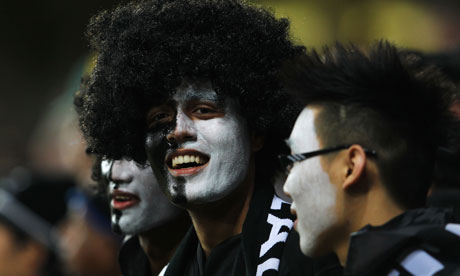
A general election is to be held in New Zealand in just over a month, but you would be forgiven for not noticing. Attentions have been devoted to a weightier, more anxious date in the diary, the final of the Rugby World Cup.
New Zealand is hosting the competition for the first time since 1987. Then, as now, the final is at Eden Park in Auckland; and then, as now, it is between the All Blacks and France. New Zealand won the Webb Ellis cup in 1987, but they have not done since.
The organisers of these finals promised a "stadium of four million" and so far have been half right.
Almost 50% of New Zealand's population of 4.4 million tuned in during last weekend's semi-final against Australia, a record figure.
Passion for the competition is not universal, but the television ratings reflect the game's popularity.
On Sunday – at 9am UK time – the game will be screened on five domestic channels and the number of viewers is bound to be higher still. It is a rare event when more than half a nation tunes in to watch the same thing.
Christchurch Football Club will be one of scores of rugby clubs across the country showing it. The mood at New Zealand's oldest club is likely to be cautiously optimistic, according to club captain Toby Giles. "Of course there will be a few nerves, definitely," he says. "I think most people are confident, but you never know with the French."
The club is also home to Richie McCaw, the All Black captain whose foot injury – which reportedly leaves his toe bone pushing at his skin like a tent pole after every game – has become a national obsession.
"We taught him everything he knows," Giles says. "I'm sure the foot is annoying him, but you work to manage it. I'm sure he's going to have a pretty long break afterwards."
In the week leading up to the final, two steely mantras have become as familiar in New Zealand as the silver fern flags flying from cars.
Players, coaches, pundits and the public all repeat the words: "Must not be complacent", usually followed by "Never underestimate the French".
France progressed to the final as if by accident, having twice lost in the pool phase (against New Zealand and Tonga) before overcoming a ramshackle England and edging out a Wales controversially reduced to 14 players.
New Zealand, by contrast, comprehensively overcame Australia in their semi-final, a game many hubristically dubbed the real final.
A French victory would be an upset of huge proportions, but any speculation about an All Black cakewalk has swiftly met with a stern rebuke. As one newspaper editorial warned: "Empires and All Blacks campaigns can be derailed by arrogance and parochial naivety."
More to the point, All Black World Cup ambitions have an unhappy knack of being foiled by the French. This most capricious of international rugby teams has twice come from behind to upset the All Blacks, in 1999 and 2007.
This time around, All Black prospects are buoyed by the rise of Piri Weepu, a man who failed to make the 2007 squad after rubbing All Black manager Graham Henry up the wrong way, and who broke his leg playing a provincial game for Wellington almost exactly a year ago.
In Dan Carter's absence the mercurial scrum-half has assumed goalkicking duties, the tactical mantle and a Messiah-like status.
Since an exceptional performance in the quarter-final two weeks ago, hardly a news bulletin or newspaper front page has gone by without an exaltation of Weepu, while a thousand online one-liners have bloomed celebrating "the Weepu effect" – "Superman wears Piri Weepu pyjamas", "Piri Weepu can touch MC Hammer", that sort of thing.
In Christchurch, World Cup enthusiasm is inevitably tempered by the series of earthquakes that have struck the city over the last year.
The largest, which killed 181 people and left much of the city in rubble in February, fractured the recently refurbished stadium and led to organisers reluctantly relocating the seven games scheduled to have been played there.
"You can't get away from the fact that there is not as much hype and not as much atmosphere in Christchurch because we don't have the games," says Giles.
"I've been lucky enough to travel around and see some games, and it's only when you go to places like Dunedin and Auckland that you realise what a massive loss it has been for Christchurch. The vast majority of people haven't been able to experience that atmosphere in their town."
The final on Sunday will be difficult to avoid, even in some churches.
"We're encouraging everybody coming to the service to wear black, and just to hang around and be as mad about rugby as the rest of New Zealand," Daniel Tiati, pastor at one Wellington church, told Radio New Zealand, explaining that a big screen would be assembled for parishioners to watch the game. "There's no shelter in any part of our country from rugby, certainly not in church."

